News
Istanbul Chamber of Industry Welcomes Minister of National Education Mahmut Ozer in its September Assembly
- 22.09.2021
- News
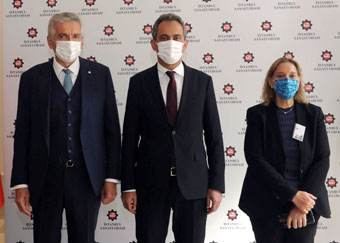
The September Assembly of the Istanbul Chamber of Industry (ICI) was held on September 22, 2021 at the Hilton Istanbul Bomonti Hotel. "New Trends in Education, the Importance of Changing Paradigm in Vocational and Technical Education for Our Industry" was the main agenda item of the ICI Assembly, which was chaired by Zeynep Bodur Okyay, the President of the ICI Assembly. The Minister of National Education, Prof. Dr. Mahmut Özer was the guest of the assembly as well as the Deputy Minister of Industry and Technology Hasan Büyükdede.
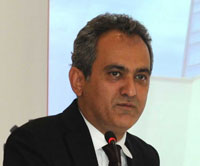
Prof. Dr. Mahmut Özer
Minister of National Education
The Minister of National Education, Prof. Dr. Mahmut Özer delivered a speech to the ICI Assembly and said, "Türkiye's claim is related to the qualification of its human capital. If we keep the schools closed, we will lose this asset. Keeping schools open is a matter of national security. We have to train our students to take responsibility in building Türkiye's future as people who are trained in all areas. Not only educational development, but also with their psychological and social development, as well as cultural and art education. When schools are closed, it hits the disadvantageous groups the most. Schools are not just a learning environment for these children, but a place where they leave home and meet arts, culture, sports, and where they socialize. If we support equal opportunity in education, we have to keep schools open. I would also like to thank ICI for its support in keeping schools open and supporting the vaccination campaign during this process.".

The Deputy Minister of Industry and Technology, Hasan Büyükdede also gave a speech at the ICI Assembly. Büyükdede said: “We are still a small industrial country and have a long road ahead of us. We have decided to expand our industries over the next 10 years in line with our current industrial areas. We need to bring our existing industry of 300 thousand hectares at least to the 550 thousand hectares held by Italy. We need to expand our industry by 10 percent every year. And we need human resources for this. In our macro plans, we should plan jointly where we want to be. Many countries aim to produce in Türkiye instead of producing in China. As Türkiye, we should be prepared for this. We need to be prepared for human resources just like we are preparing in terms of space and energy. Many companies are coming to Türkiye to invest. And the first thing they ask about is human resources right after land."
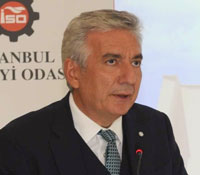
ICI's Chairman Erdal Bahçıvan
In his speech at the ICI Assembly, the ICI Chairman Erdal Bahçıvan pointed out that the Vocational Training Cooperation Protocol they signed with the Ministries of National Education, Industry and Technology has now become a brand and announced two new projects: With the "Vocational and Technical Training Development Center," which will be a first in Türkiye, we aim to strengthen the social status of vocational and technical education, increase its quality, strengthen the relationship between education and industry and develop the human and corporate capacity of the region. Five schools have been chosen by the Ministry of National Education for transformation into Welding Excellence Centers that will train the personnel required for resource training."
The September Assembly Meeting was called to order by Zeynep Bodur Okyay, the President of the ICI Assembly. Okyay said:
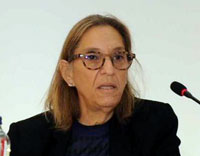
President of the ICI Assembly
Zeynep Bodur Okyay
“Our habits that have brought us to this day are changing. As an industrial sector, we need qualified human resources to achieve sustainable growth. Technological transformation is accelerating as a result of challenges in productivity and employment and quality of life. Data is growing exponentially today. Data analysis is getting diversified. Learning pace has become a significant competitive element. The adoption of artificial intelligence technologies is expected to affect half of the world's economy. Innovation, knowledge, and skills will be decisive in the future's international competition. The price of inactivity can be very heavy for any country. A fundamental question about the future: Is there going to be enough jobs for everyone? According to a study conducted in 2020, 7.6 million jobs will be lost in Türkiye by 2030, but there will be 8.9 million new jobs instead. Rather than an argument seeing job only as an income channel, we need a human-based perspective."
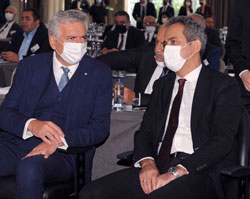
After her speech, Okyay invited Erdal Bahçıvan, Chairman of the ICI, to the stage to give his speech. “21st century is an era which revolutionizes information and communication technologies, as it have in many other areas” said Bahçıvan. "Rapid innovations that disrupt our social and individual lives are forcing everyone to look for a more competitive education system. As observed in the studies incorporating different countries, Artificial Intelligence, big data analytics, and cloud technology are among the factors that will contribute to business growth in the coming years. As a result, it is evident that organizations will prioritize technology in their mid-term investments, and topics like the Internet of Things, virtual (VR) and augmented reality (AR), machine learning, and digital marketing are on the radar of corporate agendas. It is evident that the intensive use of technology in education is also needed. As for us, the industrialists, we see that industry works with the manpower trained by the education system. Furthermore, the training process is tasked with ensuring that society prepares for the industrial and production culture. An educational system that is unaware of innovation, competition, science, and technology cannot help the industry. We should focus on training qualified human resources who can effectively fulfill the new occupations of the new age. At this point, this is the question that needs to be asked: ‘What can we do in the face of the need for qualified people, which will become even more significant in the very near future?’ The first thing we must do is to place the necessary importance on qualified education starting today.”.
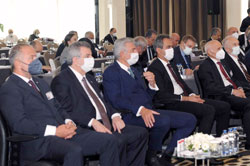
Bahçıvan stating that they see the "Vocational Education Cooperation Protocol" signed with the Ministry of National Education and the Ministry of Industry and Technology, and effective since January 25, 2019, as a solid bridge between vocational education and production life. “This practice not only increases the quality of vocational education but also provides the training of qualified human resources the industry needs. Our purpose is to create jobs for our young people who have been trained with vocational high school education and who have gained work experience during this period in the fields of their education in a manner so that they will be proud of their professions. I believe there can be no greater service for our society and for individuals than this. Within this scope, we provide competency training and internship programs in real-life production environments and facilities to the students of vocational high schools for three years. We are also working on rendering in-service and on-the-job training for our teachers, updating framework education programs, ensuring that our schools produce in a project-oriented manner and supporting successful projects. Under the Vocational Education Cooperation Project we started with 35 schools in Istanbul, and reached a significant number of 66 schools with high schools of fine arts, welding excellence centers and private vocational schools. On the other hand, we are developing these schools together with more than 130 Assembly members and members of professional committees in various sectors.

“We are organizing training workshops, as part of the project, on subjects like digital transformation and new technological trends grasping the attention of the students. We have also established and will continue to establish collaborations to strengthen the revolving capital of schools, positioning them as R&D and production centers.”
Bahçıvan also provided information on the progress of the project: "As of the level reached, the Istanbul Chamber of Industry Training Cooperation Project has now become a brand. It has become an umbrella concept with new projects created within its structure. Blessed are we! We have transformed our professional education journey that we started three years ago into a giant snowball by keeping our dreams high and achieving them step by step, and it still keeps growing. We understand that strengthening vocational education is crucial for the future of our country and children, and we will continue to work and dream together to achieve this goal. Now, I would like to briefly share with you our new projects that are happening under this umbrella. The first of the projects is the Vocational and Technical Education Development Center, which will be a first in Türkiye. We hope to improve the social status of vocational and technical education, increase its quality, strengthen the education-sector relationship, and develop the region's human and institutional capacity with this project, for which we completed a feasibility study with the help of the Istanbul Development Agency. Another project under ICI's VEC (Vocational Education Cooperation) is the Welding Centers of Excellence. Five schools have been chosen as centers of excellence by the Ministry of National Education, and will train highly sought-after welding specialists.
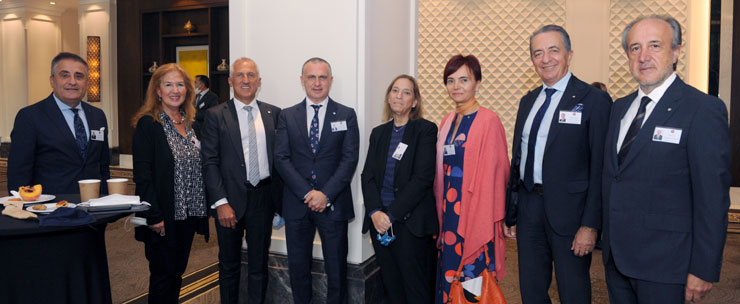
“In order for professional training to achieve its full value, it is necessary to take it to a higher level and support it with additional contributions” said Bahçıvan and continued: "To this end, we think that both families and students should be encouraged and supported financially to bring society, families, and students closer to professional education, to increase the demand for professional training. Within this scope, adopting a social assistance approach and providing financial support to families who send their children to vocational training during their education process, starting the student's social security from the first year in the vocational high school with state's financial support, providing scholarships for the duration of studies, providing tax exemption of wages for a certain period on the condition that they work in their own field after graduation and ensuring military service advantage for male students would be significant incentives to help increase demand for vocational education.”
After Bahçıvan, the Minister of National Education Prof. Dr. Mahmut Özer addressed the Members of the ICI Assembly. Expressing his gratitude for taking part in the assembly, he said that he feels like he is surrounded by family and not a foreign environment. Özer noted that they planned all the processes regarding vocational education together with ICI. “At this point, having noticed that by focusing on vocational education with a decisive emphasis, it is possible to improve toward different points” said Özer. “The project began with 33 schools, extended it to fine arts schools, and then to special education vocational schools. There have been complaints about resource issues over the years and we have established centers of perfection in welding to overcome these problems. During the three-year period, all the moves made by the Ministry in vocational education were either reflected in ICI or reflected in studies performed in other provinces after getting prepped in ICI.
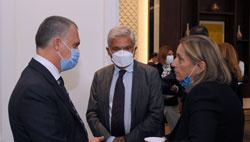
Reminding that they have been faced with a process that the world has never experienced and prepared for since March 2020, Özer expressed that one of the sectors most affected by this process is education. “We have made incredible efforts to reduce any loss in terms of learning due to the necessary suspension in the face-to-face education process to avoid any suffering by students. Vaccine is now easily accessible to all citizens and schools should be the first places to open and the last to close.”
Özer pointed out the tremendous capacity of the national education system: “It is a giant structure with 18 million students, 26 million students when universities are included, 1.2 million teachers, more than 100,000 administrative personnel, and 150,000 school bus drivers.
If we are going to normalize life, we need to normalize education. The education system is not a sample of Türkiye but a universe of Türkiye. We have developed a class-based case approach, instead of a provincial, district-based one. We have prepared a Guide for Precautions that need to be taken. There are 57,108 public schools and a total of 71,320 schools in our education system. We have 850 thousand classrooms. We took a break for 14 days only in the classrooms where there was a case of contact. In this 14-day break, we provide all kinds of support to schools to continue education. We will continue to implement this with utter determination. Our biggest advantage in keeping schools open is the rate of vaccination among teachers. The rate of vaccination in teachers is well above the Türkiye average with 92 percent for the first dose and 85 percent for those with the second dose immunity. The number of cases among teachers is very low.”.
Özer continued:
"Türkiye's appeal depends on the nature and quality of human capital. If we keep the schools closed, we will lose this asset. Keeping schools open is a matter of national security. We must teach our children to be responsible for the future of Türkiye, not only educational development, but also with their psychological and social development, as well as cultural and art education. When schools are closed, the disadvantaged groups are hit the hardest. Schools are not just a learning environment for these children, but an environment where they leave home and meet arts, culture, sports, and where they socialize. If we support equal opportunity in education, we have to keep schools open. I would also like to thank ICI for its support in keeping schools open and supporting the vaccination campaign during this process."
Emphasizing that the suitability of vocational education is not only about qualified labor, but also about the integration of the secondary education system, Özer stated that following the coefficient practices in 1999, academic achievers no longer prefer vocational education. “As the expectation of success from students decreases, teachers also begin to break loose from education”, he said. The labor market began to lose the personnel it was looking for and even if it did, its qualifications would not be enough. In the new model of co-operation, the employer is actively involved in the job itself.”
Mentioning the performance of vocational education during the COVID-19 pandemic, Özer said that they have enabled the production capacity and offered it, from masks to disinfectants and aprons, to the care of citizens. “Vocational high schools not only train qualified personnel for the labor market but also have a capacity that the state and the nation can mobilize in extraordinary conditions. Academically successful students in Türkiye have started to prefer vocational high schools. The most successful partner in implementing vocational training is ICI” said Özer.
Afterward, the ICI Assembly Members took the floor and shared their views. Questions directed by the Members of the ICI Assembly were answered by the Minister of National Education Prof. Dr. Mahmut Özer.